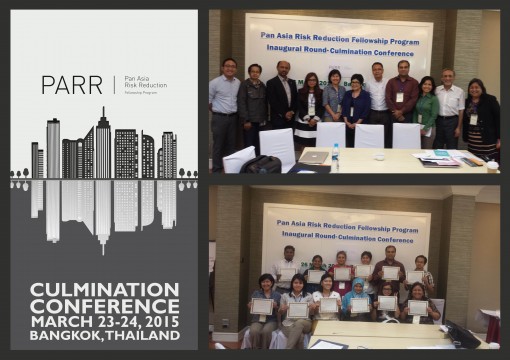PARR Fellowship Program Inaugural Round Comes to a Head

OML Center at Coastal Cities at Risk (CCaR) Conference
December 9, 2016
SEARCA and OML Center to Gather Experts for the 2015 Regional Knowledge Sharing Writeshop
December 9, 2016By Luigi Toda and Perlyn Pulhin
As member of the Pan Asia Risk Reduction (PARR) Fellowship Program Alliance, the OML Center participated in the Program’s Culmination Conference held last March 23-24, 2015 at Chulalongkorn University in Bangkok, Thailand. The PARR Fellowship Program is a dynamic and innovative program developed out of the strengths of many partner institutions within and outside of Asia. In 2014-2015, the PARR Alliance implemented the inaugural round of the PARR Fellowship Program, which offered opportunities to train 13 Fellows from all over the Pan Asia, develop partnerships, and produce outputs to further the program’s development and impact.
The Culmination Conference was participated by Alliance members, the Fellows, the host institutions and the home institutions to reflect on the experiences on the implementation of the inaugural round, to identify and strengthen the competitive advantage of the program and assess the challenges and opportunities for its continuation.
The first day highlighted the current state of risk reduction research with special reference to the recently-drafted Sendai Framework which declares the four priority areas for disaster risk reduction: 1) understanding disaster risk; 2) strengthening disaster risk governance; 3) investing in disaster risk reduction; and 4) enhancing disaster preparedness. The remaining sessions were allotted for a dialogue of learning and the Fellowship research topic and its associated outputs between the Fellows and the non-Fellows which also allowed for the latter to provide valuable comments and recommendations.
The second day provided a venue for the Fellows and PARR Alliance Members to share their reflections and experiences on the Inaugural Round of the Program and to provide recommendations for the next round, such as the need for joint transdisciplinary approach to research; a clear fellowship structure; mechanism for research interest alignment between fellows and host institutions; built-in activities for exchange between fellows; establishing the roles of the Fellows in the sustainability and continuity of the program; and the selection of research themes and topics based on the Sendai Framework priority areas.
To ensure sustainability of the Program, concerted efforts among the Alliance members are crucial. This should go beyond the current responsibilities of PARR Alliance members identified as follows: 1) Strategic guidance for the PARR Program, including planning for long-term sustainability; 2) Partnership building and awareness raising; 3) Fundraising and resource mobilization; and 4) Participation in quarterly teleconferences and in-person meetings, when resources permit. Some alliance members also take on implementation responsibilities (e.g. Fellowship contract management, co-organization/hosting of interactive activities, co-facilitation of trainings/workshops).
At present, the PARR Alliance is composed of the following: Global Change System for Analysis, Research and Training (START) International; Southeast Asia START Regional Research Center; UNU Institute for Environment and Human Security (EHS); US Global Change Research Program; US National Science Foundation; Asia-Pacific Network for Global Change Research (APN), Integrated Research on Disaster Risk International Centre of Excellence (IRDR-ICoE); OML Center, Manila Observatory; International Environment and Disaster Management (IEDM) Group of Kyoto University, National Science and Technology Center for Disaster Reduction (NCDR), University of the Philippines – Los Baños, and Thammasat University.

